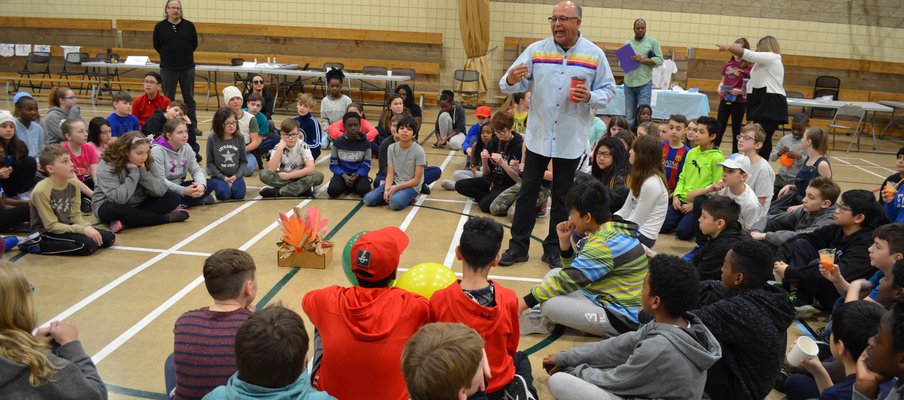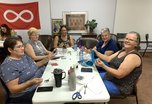Creating a Village in the Spirit of Reconciliation

Related Programs

When David Garneau was growing up in Edmonton, he and his siblings, along with the neighbourhood children would play an imaginative game they called “City”, which has become the basis for a game of Reconciliation and community called Ocênâs -“The Village” - teaching children about First Nations and Métis principles concerning gift and trade economies, social order, honour, and justice.
“In the 1980’s I was studying art in the University of Calgary and worked summers with their art and recreation department, including kids programming. One day we were overbooked and had six or seven groups. There was no way to manage that size of group, so we did a game of “City” from my childhood, printing play money and combining art activities and it was a lot of fun,” Garneau recalls. From there the idea has grown. Garneau partnered with Frédéric Dupre to help bring some students from French immersion schools in Regina such as École Monseigneur de Laval to the reconciliation projects, “So everyone could learn the principles of justice and economy, before colonization.”
Garneau says the best games involve 90 to 110 children who all come into a space and are given a description by a Knowledge Keeper of what life was like on the prairies prior to colonization. They are then broken into four lodges or groups, each working together to create a group identity before receiving more teachings about environment, honour, and other subjects. Periodically they meet again for their “night teachings” and to honour various individuals, groups, or activities. In the meantime, if something goes wrong, or there is a teachable moment, the game will stops so everyone can discuss situations. Trade becomes part of the economy and groups decide on services they can provide for barter, such as tea, beauty salon, hair and nails, or artwork. It starts around 9 a.m., and by lunch they’ll have made different things. Three members from each group work in the kitchen to create a collaborative lunch. After the feast, there is as clean-up often followed by a fashion show where they show off various creations.
“My favourite response is when the teachers come,” Garneau notes. “One of the most wonderful comments was when one of the teachers said ‘I don’t have to teach that much!’ - on their own, the kids were doing math, negotiation, logic, creativity.”
Garneau loves the way it overlaps with their education; there may already be some knowledge of Treaties or the Métis. This not only shows how things were, but how things could be once again with good relations.
Joely BigEagle Kehquahtooway is one of the Knowledge Keepers, along with her husband Lorne Kehquahtooway. “We are called upon to come and share anything that we can, and our whole focus has been about buffalo. We tell stories related to the buffalo and whatever is relevant at the time,” says BigEagle Kehquahtooway. “There are teachings about resilience, culture, perseverance and community, sustainability, not wasting any part of the buffalo, and just how we still rely on the buffalo in our culture. Combining the past to present and gaining an understanding of how we can carry that into the future, that’s our role and we like to incorporate art... it’s up to the kids to create and tap into their creative resources or energy to create something and to have fun.”
She likens the game to a huge art store that they can access and gain inspiration from the stories, the buffalo robes and the teachings, but the underlying idea is it’s a community made up of Indigenous, non-Indigenous, and newcomers, all working together to create this village.
“It’s done in a gentle way and with kindness, sharing the truth about what happened and it’s this moment in time where we want the kids to be engaged and how do you help one another build a village...it’s just an opportunity for them to go for it.”
This project received funding from SaskCulture’s Métis Cultural Development Fund.




